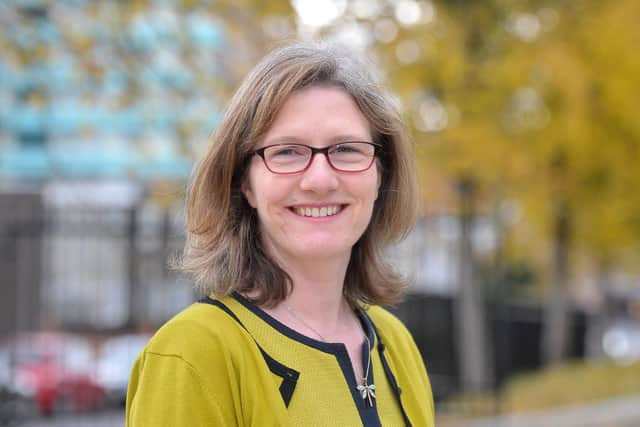Connecting Leeds Transport Strategy sets out vision for city without the need for a car
and live on Freeview channel 276
The Connecting Leeds Transport Strategy paints a picture of Leeds as a place in years to come where everyone has an affordable, zero carbon choice for how they travel, with the key objectives being to tackle climate change, deliver inclusive growth, and improve health and wellbeing.
Those goals would be achieved through six 'big moves' including the delivery of a mass transit network that has failed to materialise before now after a series of false starts.


Advertisement
Hide AdAdvertisement
Hide AdA public consultation begun into Leeds City Council's draft strategy comes a year on from the launch of the Yorkshire Evening Post's Unlock the Gridlock campaign, which set out five key transport priorities in response to concerns consistently raised by readers about the congestion and unreliable public transport networks that were blighting their lives on a daily basis.
Coun Lisa Mulherin, executive member for climate change, transport and sustainable development, said the strategy reflected the scale of the challenge faced if the city to is to meet its target of becoming carbon neutral by 2030, with how we travel around Leeds being a big part of that.
"We're very keen to hear from the public in Leeds, not only about the solutions we're suggesting and to get feedback on that but also to see if they have suggestions."
Decarbonising transport, transforming the city centre, enhancing public transport and finding new mobility solutions are among the other big moves.
Advertisement
Hide AdAdvertisement
Hide AdFor each of those key steps, the strategy sets out the work already taking place that will continue, the things that will be done next and the additional - in some cases, radical - ideas that might also need to be considered.
The latter group includes the idea of a workplace parking levy that could see employers who provide parking being charged and the monies raised being ring-fenced for transport schemes.
Another is a low carbon zone, similar to the Ultra-Low Emission Zone in London, where the most polluting vehicles would be subject to the greatest charges based on CO2 emissions.
Such a scheme could make use of the network of cameras that had been installed for the clean air charging zone which was scrapped in October after changes in activity resulting from the pandemic led the city's air pollution levels to fall back below the legally required limit.
Advertisement
Hide AdAdvertisement
Hide AdThe overarching aim that Leeds - which once styled itself as ‘The Motorway City of the Seventies’ - would become a place where people no longer have to own a car will be viewed by many as a radical one too.
Coun Mulherin said: "It's not as some people see it, as penalising car drivers, but giving people the freedom not to have a car parked on their driveway with diminishing value."
The idea instead is to create a city where people could get around by walking, cycling or using public transport for the most part, and make use of schemes such as car clubs on the occasions where they needed to drive long distances or a car was the only practical choice.
The combined measures within the draft strategy - and the work undertaken to create it - would see the priorities of the YEP's campaign met at a local government level, providing those aspects survive the consultation process and then go on to be achieved.
Advertisement
Hide AdAdvertisement
Hide AdThose priorities were carrying out an expert analysis of what is not working when it comes to transport in the city, pledging to consider a mass transit system, fixing the unreliable bus network, improving train services, and making Leeds a better place for walking and cycling.
Nigel Foster, who chairs Leeds Transport Advisory Panel, said: "The panel was formed to support the council and also to challenge the council about what it was doing on transport and mobility.
"It's the only one of its type really now in the UK. This is a panel designed to bring together people with expertise and experience in transport from across the UK and in different aspects of transport."
Among those serving on the panel is Greg Marsden, a professor of transport governance at the the University of Leeds' Institute for Transport Studies.
Advertisement
Hide AdAdvertisement
Hide Ad"It's a welcome opportunity to be able to support what I think is the most ambitious plan we've had for transport in the 20 years I've been in Leeds," he said.
"One of the nice things about reading the strategy for me is it describes the kind of place you would want to live in. Maybe there are discussions about how to get there, but I think there's a really positive vision."
Even once there is a consensus on what measures should be pursued, the usual challenge of how to fund the many strands of work has been intensified by the financial pressures facing both local and central government as a result of the pandemic.
Mr Marsden said: "It's going to be a difficult funding climate in the next decade so it's particularly important that Leeds demonstrates it's on the front foot and knows where it's going - that's going to be the key to unlocking funding."
Advertisement
Hide AdAdvertisement
Hide AdAcknowledging that major transport schemes have been heavily dependent on the support of the government and West Yorkshire Combined Authority until now, Coun Mulherin pointed to the election of West Yorkshire's first mayor - currently due to take place in May - as another important prospect.
Under the terms of the £1.8bn devolution deal agreed with the Government, whoever is elected will have a £30m annual budget and powers over transport, education and infrastructure throughout the county.
Coun Mulherin said it was another reason for pushing ahead now with finalising a transport strategy backed by residents and businesses, adding: "We do need to have the mandate from the public. I think if we've got a very clear support then it strengthens their arm."
The consultation will run until March 26, before the feedback from the public and other stakeholders is reviewed. An updated strategy is then expected to be published in early summer.
Advertisement
Hide AdAdvertisement
Hide AdVisit leedstransportstrategy.commonplace.is/ to learn more about the proposals, read the draft strategy in full or make comments.
Support the YEP and become a subscriber today. Enjoy unlimited access to local news and the latest on Leeds United. With a digital subscription, you see fewer ads, enjoy faster load times, and get access to exclusive newsletters and content. Click here to subscribe.
